Co. I, 110th Infantry Regiment, 28th Infantry Division

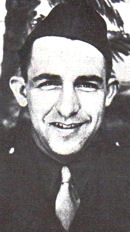 First of all, I must say that my Army and combat service was shorter and less eventful than many others, but here it is.
First of all, I must say that my Army and combat service was shorter and less eventful than many others, but here it is.
In September, 1940, when all young men were required to register for the draft (Selective Service). I was married and had a pretty good job. So, a few months later, when my employer, having Government contracts, obtained "job deferments " for his key people, I was happy to be considered one of those. I was a production foreman at the time, and had no desire to leave my job for the service.
This changed on December 7, 1941, when Pearl Harbor was bombed. I, like many others, considered joining up. However, my boss and my young wife, convinced me that I was more valuable to the war effort to stay home at my job. So, for the next 2 years, I did this. But as time went on and many of my friends were either enlisting or being drafted, I became more and more uneasy about my status.. So, it was with mixed feelings that I received my "Greetings from President Roosevelt, Congratulations, you have been selected, etc.") in late 1943. It was not easy leaving my young wife and small daughter, but a relief that it was no longer my decision to make.
And, when 41 other Oregon draftees and I were sworn in the Army, that cold, rainy, March, 1944 night at Fort Lewis, Wn., it was one of the prouder moments of my life. We were a mixed group, ranging from an 18 year old farm lad who still had the odor of cow manure on his shoes, to a 32 year old, well dressed lawyer from Grants Pass. Within a week, 38 of our group ( 4 men had some physical problems) plus a non-com who was in charge of us, were on a Pullman car headed for an unknown destination. About the 3rd day, our lawyer wheedled our destination out of the Sgt. He was told that we were on our way to Camp Fannin Tex., which was an Infantry Replacement Training Center. So, it appeared that, no matter our civilian experience, we were all to become Infantry men.
After our arrival at Camp Fannin, we began our 6 weeks basic training and 11 weeks of advanced Infantry training.
I suppose I bitched as much as some, but overall I somewhat enjoyed that 17 weeks at Camp Fannin. As a lad, I was a skinny, mediocre athlete, so was proud whenever I was able to be among the upper percentage with some of the training. Here are some of those.
Made Expert on both the M1 and the .30 Cal Carbine — Sharpshooter with the B.A.R. - Barely qualified on moving targets with M1 — Average or better with live hand grenade throwing. — Only Marksman on the .30 Cal Machine gun — Somewhat better with the .50 Cal. M.G. and good scores with the 40mm and 60mm mortars. Those of us who made Expert with the M1, were given sniper training, which I detested and either intentionally or unintentionally. nearly failed with the scoped sniper rifle.
Mostly, I liked the field exercises, night and day, especially when I was the appointed squad leader, (except for the mosquitoes, the chiggers and the copperhead snakes)
As I remember, after the 8th week, we married men were able to bring our wife and kids to Tyler, Tex. If we could find housing and prove that we could pay for their train fare and their living expenses while there. I was fortunate to rent a room with a nice family in East Tyler and sent for my wife and daughter. So. I was able to spend most Saturday night and Sunday with them. The one room and sharing the bathroom with the family, was a little cramped, but my wife never complained.
At the end of our training cycle, with the exception of a few, we received our shipping orders. Half of us to Fort Ord Cal. for shipment to the South Pacific. The other half to Fort Meade Maryland for shipment to Europe. I was happy when my orders were to Ft. Meade. We all received a 10 day "Delay Enroute" to our homes.
At Ft. Meade, we were issued all new clothes and equipment which included new M1 rifles. Ammo belts, bayonets, sleeping bags gas masks (the old bulky kind that proved to be un-needed) canteens. mess gear etc. Also, we were issued the new barracks bag with the shoulder strap to hold our "worthy goods".
I can't resist telling a little side story here. When we inspected our issues, there were 4 prophylactics in the first aid kit. My upper bunk buddy, Mac, who was about my age, with a wife and 2 children, had been up on a Minnesota farm in a strict Christian family. When he took out the condoms, he looked puzzled. Then he asked me. "What are these things for?" I told him, " If you don't know what they are for, you wont need them." When I tried to explain what they were used for, be said, "I sure wont be needing them" There were plenty of guys willing to take them off his hands.

M1 Garand Rifle
Another little story at Ft Meade — when we received our new M1 rifles, they were coated with Cosmoline. We were told that if we passed inspection on Friday, we would be issued a 2 day pass to Washington D.C. One of the requirements was, that our rifles had to be completely free of Cosmoline, inside and out, to pass inspection. With nothing but a few patches and a G. I. scrub brush and G. I. soap, I could do a fair job, except I could see Cosmoline seeping from the bolt. Although we had never had permission to dismantle the bolt, I decided to give it a try. I went to an open window in our upstairs barracks to have a better light. When I took the bolt apart, the spring flew out the window to the lawn, below. I was frantic, as time for inspection was only a few minutes away. 3 of my buddies and I rushed down stairs to retrieve the spring in the tall grass. Luckily, one of the guys found it quickly and I rushed back upstairs to put it together. The men were all lined up when I dashed downstairs and took my place in formation.
So, the good luck (if that is what you call it) that has followed me much of my life, held and I was complemented on the good job that I had done with my rifle and given the 2-day leave to Washington. That was a thrill for me, as I was able to see many of the sights that I had read about, but never expected to see.
From there, we were trucked to Camp Kilmer in New Jersey to await our ship to arrive in New York harbor. While there I received a 2-day pass to New York City. Again, I was able to see sight that I had read about and never expected to see.
Within a week, under darkness, I was loaded on the Ile de France, a converted luxury liner, with 10.000 other troops.
The nine day trip across the Atlantic was mostly uneventful, as we zigzagged unescorted. Our ship was one of a few that could outrun the German subs. We did have a couple of sub warnings, but nothing came of it.
We debarked at Gourock , Scotland and went by train down through Scotland and England to Southhampton. There, we boarded an old English ship with an Asian Indian crew to cross the channel to France. We sailed after dark and, after a meal of cold, greasy mutton and bread we were given hammocks to tie over the dining tables. The mutton was inedible, but the bread was not bad. I was never able to master the hammock and, after being thrown out onto the table, I gave up and slept on the hard table.
At daylight, we were anchored offshore a couple of miles. We were loaded in to LCI's that could land on the beach. We were told that this was the famous Omaha Beach. Of course at that time it had been secured and our Armies were at the Siegfried Line. But I think that, as I viewed the devastation there, the reality of war hit me. This was not the war games of Camp Fannin and Ft. Meade. This was the real thing!
From there, we were trucked across France to a Repo Depo (Replacement Depot) in Belgium, a few miles back of the front. There, we would receive our orders to a front line unit.
We were assigned "Foxhole buddies" for our stay there. Carl, my buddy, proved to be a good buddy. He was past 30 was married with an 8 year old son and had traveled much as a civil engineer. I learned much from him about "making do" during the two days we were there. One of those concerned our sleeping facility. Where we pitched our pup tent in the dense woods, we found the ground was very hard. We were restricted to the wooded area. Carl had made a reconnaissance of the area and found a nearby field of bundles of grain. So after dark, we went to the field and brought back several bundles to put under our sleeping bags. The next morning when everyone was complaining about the hard ground we didn't tell our secret.
Carl had a gift of gab that gave us another advantage. We went to the supply tent where Carl engaged the Sgt in a lengthy conversation. We saw a few musette bags with the shoulder suspenders that we wanted. These were not regular issue to us lowly replacements, but would be desirable to have . The harness would allow us to attach the ammo belt so that the weight was on our shoulders instead of on our hips. When Carl asked for two of them, the Sgt. said that he could not give us them. However, with Carl's gift of gab, we walked out with them. We were the only ones in the group of hundreds who had musette bags and harness, and envied by all.
The second day, we were given our orders. Carl and I were assigned to the 5th Armored Division, with 40 more men, on detached service. This meant that we were to be on temporary duty with them, for a specified time, then return to the Repo Depo for permanent assignment. This would be our "Baptism of Fire" as they were on the Siegfried Line, facing the enemy.
That night, all was quiet in the dark Belgium woods. Everyone, I suppose, with their own thoughts of home and the prospects of soon being under fire. Carl lay silent in his sleeping bag in our pup tent for along time. Suddenly he said, "Are you awake. Tom?" Then he said: "I cannot sleep, wondering how many of us, this time next week, will be alive and how will I act under fire. In a way to make my son proud, or will I disgrace him?" That was food for thought, as we anticipated our Baptism of Fire.
Those weeks with the 5th Armored Div., as we probed the Siegfried Line, was not as bad as I had expected. We were under somewhat steady artillery fire and some small arms fire from the Germans, who were mainly holed up in the pill boxes and other fortifications. We were in well constructed fox holes with log overheads so were quite safe except from a direct hit. Both the Germans and us ran night patrols to get information.
After the 2nd or 3rd week, I was assigned to the company headquarters, where I guarded the CP. (with 2 others) at night and traced out and repaired the phone lines to the forward posts that were cut by the Germans at night. It was a little hairy, but I was glad to sleep in a house instead of a foxhole. Referring to sleep. I got twice as much sleep as the other two men. I stood guard alone for my one third of the night The other men preferred to stand guard together.
It was here that I saw my first live German soldier, close up. One dark, rainy night I heard, in a strange voice. "Komarad, Komared, Nicht Shootzen". Two German soldiers had had enough of war and came in to be captured.
As you probably know, the Siegfried Line was finally broken through, when some GT came up with the idea of welding a steel blade on the front of the tanks that allowed them to root out the Dragon's Teeth that had not allowed tanks and other vehicles to penetrate.
The day that we were scheduled to return to the Repo Depo. Carl told me mat the Company Commander had asked permission to have 3 of us assigned permanently to his company. He was still waiting word from his superior when the trucks, with us aboard, left for the Repo Depo. How would my story been different, had I been able to stay with the 5th A.D. I will never know.
At the Repo Depo, we all received permanent assignment to the 28th Infantry Division, who were bogged down in the Hurtgen Forest with heavy casualties, needing many replacements. Carl was assigned to the 109th Regiment, I to the 110th Reg., Company I. Incidentally, I learned, after the war, that Carl suffered severe Trench Foot in the Hurtgen Forest and was sent back to a hospital and finally England and home.
About 25 of us were trucked to a rallying point at the head of the Kall trail that led into the Hurtgen Forest. There, we were led by huge piles of ammunition, K-rations and other supplies. We were told to take as much as we wanted, as no one knew when we would have a chance to get more. I loaded myself with several ammo bandoleers, K-rations and dry socks. We were then lead by a scout, down the trail toward the Hell of the Hurtgen. A couple of miles from our forward positions, we stopped at our company kitchen. While there, it took a direct hit from an artillery shell. Fortunately, most of us were in foxholes and were not injured, but some of the cooks and K.P.s didn't fare so well.
After dark, we were led into the forward positions, where we hunkered down in pre existing fox holes. I had a new foxhole buddy, named Wayne Newman, from Iowa, who would be my foxhole buddy for the time that we spent in the Hurtgen. (By the way, we kept in touch after die war up until his death a few years ago)
By the time I joined Company I, they had received so many casualties that we were unable to make an advance. Except when we made night patrols behind their lines, we spent much of our time hunkered down in or foxholes for protection from the constant Artillery and mortar fire from the Germans on die opposite hill. At one time, we were assembled at the Company Commander's hole to make an attack on their positions. There were so few of us to make the attack that it was canceled.
As long as we did not get a direct, or near hit, the big broken tree tops that we covered our fox holes with was good protection from the tree bursts. Many of our men were not as lucky as Wayne and I. So the casualties kept climbing and the task of carrying them out was unending.
By this time, because of a couple of times when I should have "Got It". I felt that I was living a guided life. One incident occurred that made me doubt for an instant. The Germans, every evening, sent mortars and artillery at us in a pattern that we called "Raking the Hill". They would put one round near the top, a second or two later, another round lower down and the third round below that. They then moved over some 30 or 40 yards and repeated the three rounds. Our foxhole was about the level of the third round. This time, as Wayne and I sat in our foxhole, we heard the first round hit directly above us. We knew where the third round would land. There was no time to do anything but hunker down (and pray). The second round exploded a short distance above us. Then, our foxhole shook and dirt came in on us, — but no explosion. I don't know how long we were silent before we both said "A Dud". Later we found the projectile buried in the edge of our foxhole. What are the chances that THAT round would be a dud?
Wayne was a good foxhole buddy who never lost his cool. For the most part, he did his share of our duties, without complaining. Much better than another F.H. buddy that I had with the 5th A.D., who was so edgy that I got little rest or sleep while with him. The only complaint that I had with Wayne was that, when we loaded up with supplies, going into the forest. He did not bring enough K-rations and only one pair off socks. Between us, our dry socks were used up long before we were relieved and the K-rations were gone a few days before then. We were down to a few packages of Nescafe dehydrated coffee and a couple of D Bars our last days in the Forest.
Time has not erased the sights and sounds of the Hurtgen Forest in my mind. Those beautiful conifers were totally without tops. The tree bursts had given them the appearance that a giant scythe had mowed them off at mid-height The many foxholes that showed the signs of the wounded or the graves of the dead. The steep terrain and tangled tree tops and thick brush that made it hard to move fast. And the sounds!! Bursting shells — and worst of all the cries of the wounded.
I will describe one incident — One evening, a couple of hours after dark, the shelling was going on in our area. After one burst we heard a man screaming for a medic. It was coming from a foxhole a hundred yards from ours. His calls for a medic, did not seem to be answered Being somewhat chicken-hearted, the constant screaming got to me. I told Wayne that I could not stand it any longer, that I was going to the guy. Wayne cautioned me that the shelling was still going on. I took my flashlight and crawled to the wounded man's foxhole. When I shone it in the torn up hole, I could see one prone, mangled body. The wounded man was still screaming. Having limited First Aid means, I took off his belt and tied it above his leg that was gushing blood. I then found a large hole that contained an officer, 2 non-coms and a medic. As they were much closer to the wounded man than Wayne and I there was no reason why they could not have heard his cries. This is one of the few times that I scolded an officer. He then meekly ordered the medic to go with me and treat the wounded. I must say here, that this officer was not an example of most of our officers.
Finally, on the night of the 16-17th of November, we were relieved by the 8th Division. And so another Division was decimated (I think there were 3 other divisions) trying to get through the Hurtgen to capture the dams in the Roer Valley. I knew that our numbers were small when we came out, but did not know how small until 12 or 15 years ago, I got a book titled "Follow Me and Die" by Cecil B. Curry a story about the Hurtgen battle. In that book, he says that my 3rd battalion went into to the Hurtgen with about 875 men. During the battle, nearly 1000 replacements were added. When we came out there were only 75 combat- able men left (Wayne and I were two of them, I suppose.) In addition to the killed, wounded and captured, many were sent to the hospital with severe Trench Foot, frostbite and pneumonia.
After a few hours of sleep at the rallying area, the remnants of our division were loaded on to 6x6 trucks and headed south. By the way, after days of rain and wet snow, our clothes, shoes and bed rolls were water soaked The night turned clear and cold. When Wayne and I woke up, our blankets were board stiff. When we started to walk, we found that our feet were frozen. When they thawed the excruciating pain came.
In spite of the pain, were all in a good mood thinking that we were going to a rest area to recuperate. But that didn't last long. As we went down through Belgium and crossed into Luxembourg, we were finally told that our destination was on the west side of the Our river that divide Luxembourg from Germany We would be facing the German Army that was on the east side of the river. So, there went our hopes for a rest area. We were unloaded by a country road and were told that we would walk across fields about 3 miles to a village. Carrying our rifles on one shoulder and all of our worldly good in a full barracks bag on the other was torture for those of us who had frozen feet I would guess that the number of us with frozen feet was about 75%.
At the village of Weiler, which is a couple of miles from the river, our company settled in buildings and re-organized. My third platoon, normally consisted of 3 or 4 squads. Each squad had a Staff Sgt. as a squad leader, a Buck Sgt for an Asst. Squad leader, a B.A.R. man and 10 rifle men. We could only muster 2 squads with a Staff Sgt, and four of five riflemen each. I was soon named the Assistant squad leader. However, I still had only a PFC rating. The permanent rating was to come in time.
We were told that this was considered a somewhat quiet front. That the Germans did not have enough power to attack in force across the river and, until we received enough reinforcements, we would stay put. For nearly a month, this proved to be true. The Germans sent many patrols across the river and actually occupied a village on our side of the river. My squad found this out when we were sent to check it out. We met heavy fire from the castle there, and after a half hour of exchange fire, we decided that we were badly out numbered and left the area.
Our duties consisted mainly of alternating days in hidden outposts ( haystacks, thick brush, etc) along the river, and the other day running patrols, hunting for their patrols or making contact with other of our units. On the days that we were on outposts, we left Weiler long before daylight to stay hidden during the day. Staying there until after dark to return to Weiler for the night. On one occasion, the entire platoon, lead by a young lieutenant, tried to make an attack across a bridge. We were met with such heavy mortar and small arms fire that we were ordered to break it off. We suffered some wounded but no serious injuries. My luck held and the closest I come was the guy next to me took a little shrapnel.
There were a few more incident with German patrols, but they were seeking information and were not interested in a fire fight. But then came December 16, the beginning of what later become known as The Battle of the Bulge.
To begin with, I should not have been in Weiler, that day. That weekend was supposed to have been my turn to have a 3 day pass to Paris. But the day before I was to leave, my platoon Sgt, who had only recently returned from a hospital, pulled rank on me and took my place.
On the night of the 15th, I was on guard about 2300 hrs. when a night patrol to the river, from the 4th platoon came back to Weiler, I asked one of the guys if they saw anything interesting. He said, "Naw, just that we heard the Germans across the river, having a party. They were drunk and hollering loud, music playing and it sounded like some women's voices. So we don't need to worry about them doing anything, soon. Little did we know that they were not having a party, but were making preparations to cross the river in huge numbers for their daybreak attack on Weiler.
About 0530, I was awakened by an artillery round hitting the tool shed attached to the house where I was sleeping upstairs. I was fully clothed, with my rifle in bed with me, so I jumped out of bed, grabbed my overcoat and ammo belt and ran down stairs to join my squad. The artillery barrage continued for a long time, and we knew that an attack would probably follow, so we took up our defense positions. We had no idea that it would be in such large numbers, as we thought they were as undermanned as we were.
As to our numbers, I failed to mention that during the time that we came to Luxembourg, we received several replacements and others who returned from hospitals, but still not enough to form a third squad in our 3rd platoon. (Incidentally, I had a promise that I would probably become that squad leader, but I will never know) — I recently obtained some Company daily records that shows that, on December 15th our Company consisted of 6 officers and 126 enlisted men. This, of course, included non-combat men, cooks, K.P.s, mail clerk, company clerk, truck drivers, etc. So our combat strength was little over half strength.
As the fog lifted after daylight, we could see a great number of German troops among the trees on a hill some 200 yards from the edge of the village, and the battle for Weiler began.
I will not go into a lot of detail about that day's battle, except for a few incidents -- About mid-morning, my foxhole buddy, who I had only met a short time before, and I were in a shallow, partially dug foxhole, with our shoulders and head above the rim, as we exchanged fire with the Germans on the hillside. Our position was about 25 yards from the edge of a ravine. The top of the ravine was covered with low, thick brush. Suddenly, a shot hit in the dirt behind us. We realized that it had come from a close range. As we tried to see where it came from, a Mauser bullet struck my F.H buddy, just below his steel helmet. A brave, but foolish German soldier had crawled up to the edge of the ravine, some 25 yards from us and, peering through the brush, he had two targets. He chose the other guy. (more proof that I was leading a guided life) By firing, the German exposed his position in the brush.
Shortly after, the Germans indicated that they wanted a 15 minute cease fire, to pick up their dead and wounded. Our C.C. sent word for everyone to cease fire for 15 minutes. There was another 15 minute cease that day. Then, sometime during the afternoon, a German, carrying a white flag came into Weiler. His message was, asking that we surrender the town. If we refused, they would call in another division who was close by and finish us off. Our C.C, Captain McKutchin, refused their offer and the battle continued.
By dark, we were nearly out of ammunition and the Germans occupied the lower part of town. The Captain sent word to all that he could, that we were to meet at his house on the upper part of town and try to make a run over a hill to get back to Battalion Headquarters, at Consthum, a few miles west. All that got word, which included some men from the and tank crew and a Company M Machine gun squad, met there about 1900 hrs. The men were divided into two groups. I was with the Captains group of probably 40 or 50 men.
We soon discovered that the Germans had surrounded the town, but we were able to stay away from them in the dark. But were well off our course.
Daylight found us in a small, thick wooded area. We soon discovered that there were German units on 3 sides of us. The third side, was a bare, steep hill. So, when the Jerrys brought in mortars to drive us out of the woods, the Captain gave the order for us to spread out and make a run up the bare hill. We would be on our own.
As we started up the hill, the Jerrys followed us, throwing all of the fire power that they had at us. Many were victims of their fire. As I ran up the hill, I became more and more winded, with a bad side ache. In addition to a water-soaked overcoat. I had my rifle and other equipment that I usually carried. In retrospect. I should have thrown them aside, but it didn't occur to me, as the bullets were buzzing by my head.
About 3/4th of the way to the top, I spotted a shallow shell hole and dived in it to catch my breath. Immediately, several guys piled in on top of me. I could hardly get my breath, let alone, get out from under them. As the men got off of me. I realized it was quiet. A number of German soldiers with fixed bayonets ringed the hole. One of them said in English, "For you, the war is over". There were 15 of us, some with wounds, that were captured there. I later learned that a few men made it over the hill, but was told by one of them, that within a few days, most of them were killed or captured, including him.
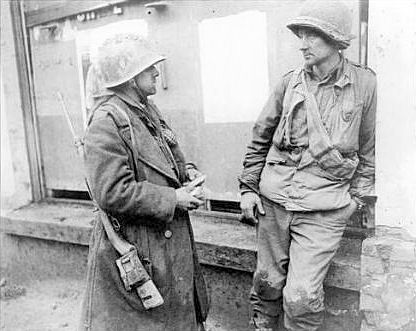
A pair of survivors of the 110th Infantry, 28th Division on 19 December
after the regiment had been shattered by the German assault.
The Company records that I recently received, stated that, as I mentioned, that on the 15th of December, the company numbers were 6 officers and 126 EM.s. The next company record was December 25th. It shows, 1 officer and 6 E.M.s present. The rest are listed as MIAs (missing in action.) The rest of our Regiment records read about the same.
I will try to keep my P.O.W. story as brief as I can. But I must mention that this was my first of two times to be captured. The second time was late that day.
We 15 POWs were taken to a nearby grist mill where there were a number of wounded, both German and Americans, in the building.
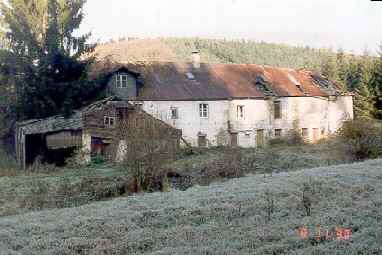
Kehrmühle near Hoscheid.
The Jerrys hitched 2 horses to two wagons and loaded the wounded on the wagons. We POWs who could walk, walked behind the wagons and when the hill was too steep for the horses to pull, we were required to push. We did not know where we were headed. As we pushed the wagons, suddenly, we come under artillery fire. I think possibly, an American tank sighted us from a distance and fired his 105s at us. However, it could have been German fire.
The concussion knocked me out. When I came to much later, as I sat up, I saw only dead horses and remnants of the wagons. Several bodies lay around. The only live person was a German soldier, running around in circles, who was apparently blinded by the blast. Soon, another POW sat up. He too, had been knocked out. I motioned him to follow me. At the top of the hill, I saw a house that had a window in the cellar. As there was still some artillery noise, I dived into the cellar, with the other guy behind me. As I shined my flashlight around (that I still had in my pants pocket) in the tiny cellar, I saw some civilians huddled in one corner. There was a middle aged woman with two small boys, a middle aged man and a young girl about 18 or 19 years old. The woman brought out some bread and, spreading jam on two slices, handed it to us.
As it was close to dark and I could hear no noise from above , I wanted to get out and try to head toward what I thought would be our Battalion headquarter town, before dark. As I started up the narrow, steep stairs, the girl grabbed my arm and excitedly told me something in their language, which of course, I couldn't understand. As I wanted to get going, I pulled loose and started up the stairs, with the other guy following me. At the head of the stairs was a dark window-less room. The only door led into the house. I opened it and peered into a small room with several cabinets. As I peeked around them, I heard a noise from the darkness behind me. A German soldier who had been standing in the darkness, poked his rifle at me. So. I suppose, stupidity on my part ended my attempt for freedom. I was led into the main part of the house, where there were German officers at every window, peering through the curtains. Probably, if I had tried to go out the cellar window. I would have been seen by them. Who knows?
As I said. I will try to keep this brief.
Taken, with a large group to Bitburg, Germany, to a temporary POW compound. — Spent a week digging out victims of our bombers. — Christmas Eve, a large group of us were taken on the road, headed east. With frozen feet each night, as we slept in cold buildings or sleeping on the road, with sparse rations, if any. As an example, one time we were not given anything to eat for 3 days. At that time, we were herded by a large pot of boiling, marble sized potatoes. Four of those were plopped in my hand. It was two more days before we got anything to eat.
On January 10th we arrived at Stalag IV-B, about 70 miles south of Berlin. When we stripped for cold showers, we were weighed. I was told that my weight was about 120 lbs. When I was captured, I weighed 175 to 180 lbs.
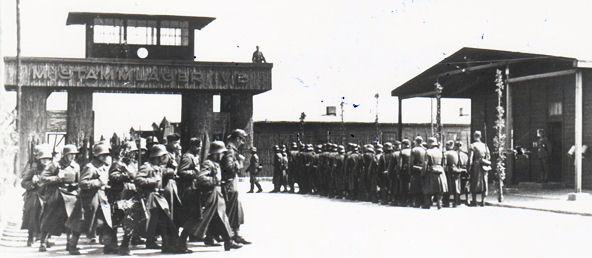
Stalag IV-B Mühlberg, Germany
Above: Main Entrance, Changing of the Guard
Below: Aerial photo of the camp superimposed in Google Earth
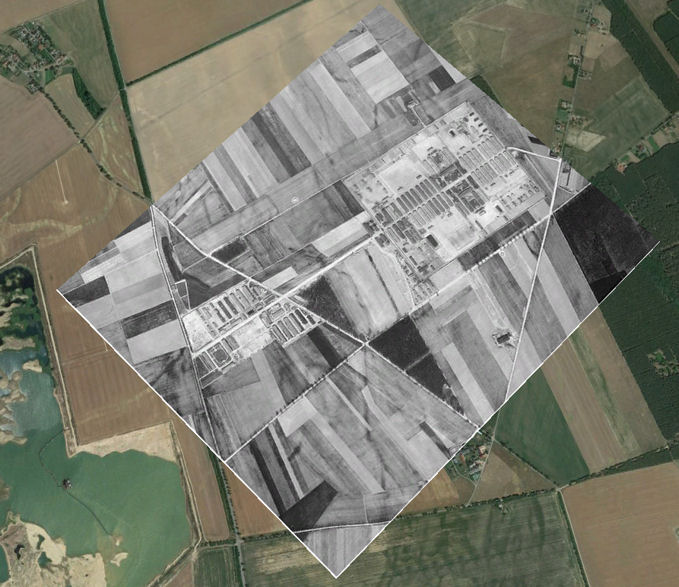
click here for location of former Stalag IV B
The food there was daily, but consisted of a Campbell tomato sized can of watery potato soup and a small piece of bread.
Near the last of January, 300 of us were loaded into small box cars, 60 men to a car (Mostly standing room only) with two days bread ration. Due to the railroads being
knocked out by our bombers, we were in the box can for 4 or 5 days. Our box car had a crack in the floor that served as our latrine. With a large number of men with dysentery, it was well used.
We were taken to a work camp near Zittau in east Germany, where Germany borders Poland and Czechoslovakia. We were divided into work groups, many of them were put to work with pick and shovels repairing bombed railroads. The rest of us worked at a construction site at Hirschfelde, a town about 6 or 8 miles from Zittau. Most of the the time, we walked the 3 miles to Zittau, where we boarded box can or gondolas to Hirschfelde. On a few occasions, when the rails were bombed out, we walked, cross-country to camp. At the work site, I was fortunate to be selected as one of three carpenter's helper. (My good luck was still holding)
Two events while there at the work camp. — In early March, I contacted pneumonia and was "Out of it" for about 3 days. Without my knowledge, I was carried to the "Sick Barracks", the only barracks with heat. With the aid of 2 aspirins I soon recovered enough to go back to work. — In mid April, we received our first Red Cross food parcels, a cardboard box, approximately 8" by 10", 4 inches deep. With everything from dried prunes, a can of spam, crackers etc to a tin of Canadian cigarettes. There was enough parcels for 2 men to a package. That was one of the highlights of our stay there.
On May 5th, as I remember, when the Russians were knocking at our door, the guards took the remaining 125 of us, (our numbers had been reduced by those who died or were shot by the guards, trying to escape and those who were sick or injured and sent to hospitals.) on the road to the west. The second day out, we came under Russian artillery and bombing. When the guards ducked for cover, many of us ran out of town. I met up with six other American POWs and one English POW. The next 3 days were a mixed feeling of joy to be free and some hairy experiences, which included, meeting up with Russian Army, who were clearing out a German stronghold, to being lucky to meet a Russian soldier who spoke good English. (he grew up in Cleveland OH, before returning to Russia at age 14.) It was he that provided us with a captured German officer's command car, to try to find the Americans, who were supposed to be in Prague, Czech. Although no one was there that night except the Czech. Partisans, fighting the Germans, we lucked out again and managed to get on a road to Pilsen, Czch. The next morning, the Americans were there.
My greatest thrill came when, we met a shiny clean, American Jeep a few miles from Pilsen, with a small American flag on it. It was driven by a Sergeant and the passenger was an immaculately dressed Army Major. Quite a contrast to five bearded scarecrows, in dirty rag-tag mixed uniforms, that bore little resemblance to American GIs and the Czech. nurse who guided us to Pilsen.
The Sgt. was friendly and told us that they were on the way to meet the Russians at Prague. And that the 2nd Div. was in Pilsen. The Major saw no reason to speak to us, dirty, unshaven scarecrows.
We found the 2nd Div. of the American Army near Pilsen and separated there. This was May 10, 1945. And by the way, 50 years later, to the day. I met, for the first time since that day, Everett Clark, who was the driver of our Command car, at the Opryland hotel in Nashville, Tenn.
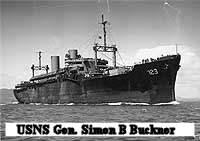 Ater a flight on a cargo plane from Regensburg, (Ger) to Le Havre, France and a month at Camp Lucky Strike near there, my group finally got passage on the troop ship Gen. Buckner for the States.
Ater a flight on a cargo plane from Regensburg, (Ger) to Le Havre, France and a month at Camp Lucky Strike near there, my group finally got passage on the troop ship Gen. Buckner for the States.
I arrived home about July 1st, with a 70 day recuperation furlough. During this time, the war with Japan ended. Then, after my 70 days home and two weeks at a posh resort at Santa Barbara, (CA). I was sent to Seattle for duty, as I did not have enough points for discharge.
In November, an order came out to discharge all ex-POWs.
I received my Honorable Discharge at Fort Lewis on November 30th, 1945.
And so, ended my brief and less eventful Army career than many.
July, 2009
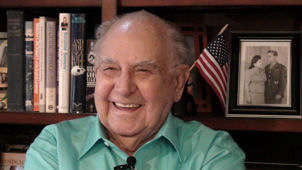

In remembrance of Thomas R Meyers
Nov 10, 1917 - † March 7, 2011
© Copyright 2009 Tom Myers
All Rights Reserved
You may download or retrieve materials of these webpages for your own personal use,
but not for any other purpose.
You may not copy, modify, publish, broadcast, adopt, amend or distribute any of this material
without prior written permission of the copyright holder.

Submitted by Robert Dent, (many thanks Bob & Tom — Scorpio)
www.SurvivalSpanish.com www.SilentSignals.comRobert Dent is a retired Oregon State Police Trooper in Bend, Oregon (U.S.A.) and is the Executive Director of the non-profit, Constable Public Safety Memorial Foundation, Inc. He is in the process of making a biographical documentary of Tom Myers' combat experiences as noted above. The documentary will be in a 2 DVD set. All profits will be donated to help families of law enforcement officers killed in the line of duty and to the American Wounded Warrior's Project. If you would like to be placed on a waiting list and notified when the DVDs are available, please e-mail Mr. Dent at: dent@silentsignals.com
